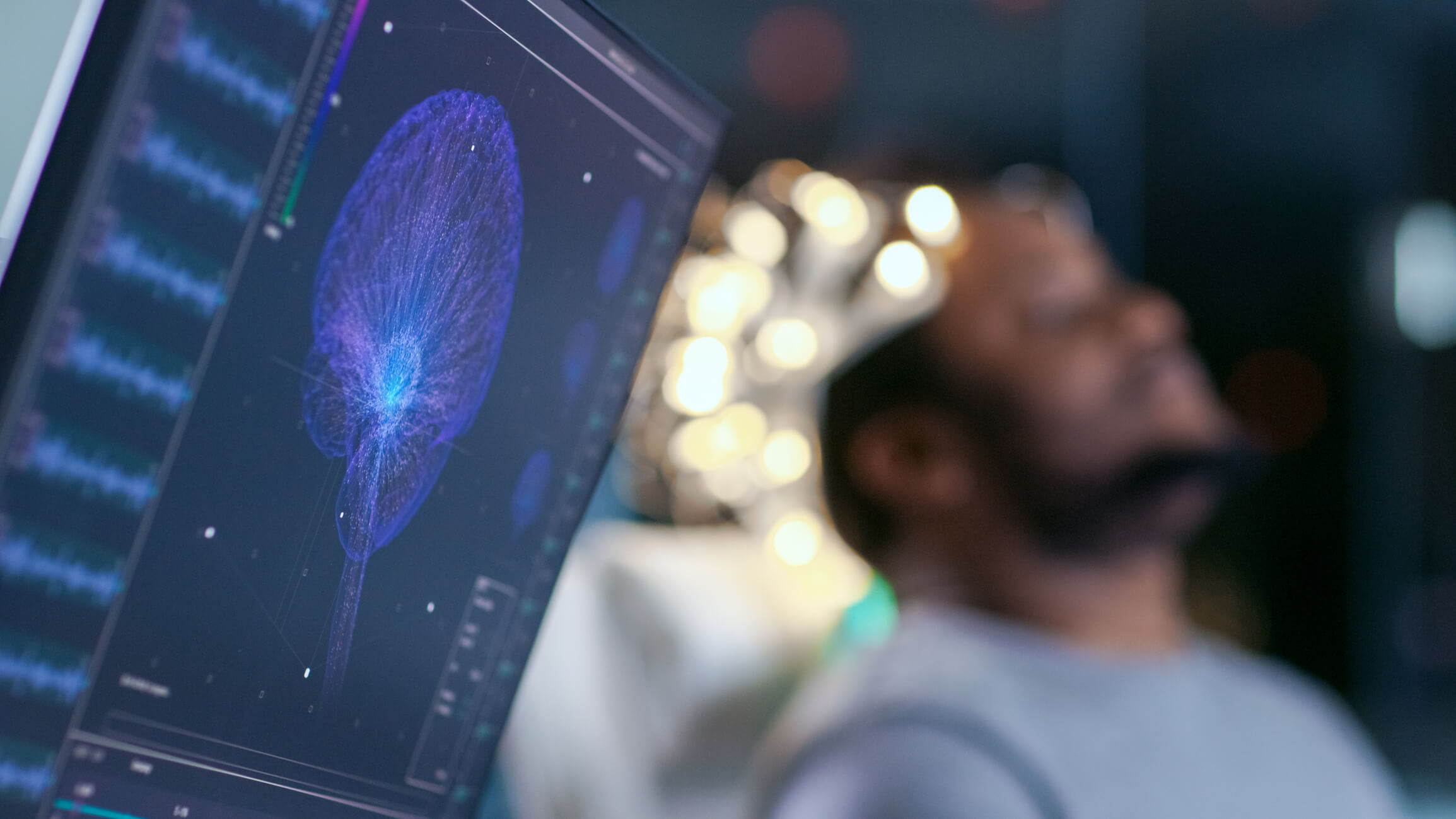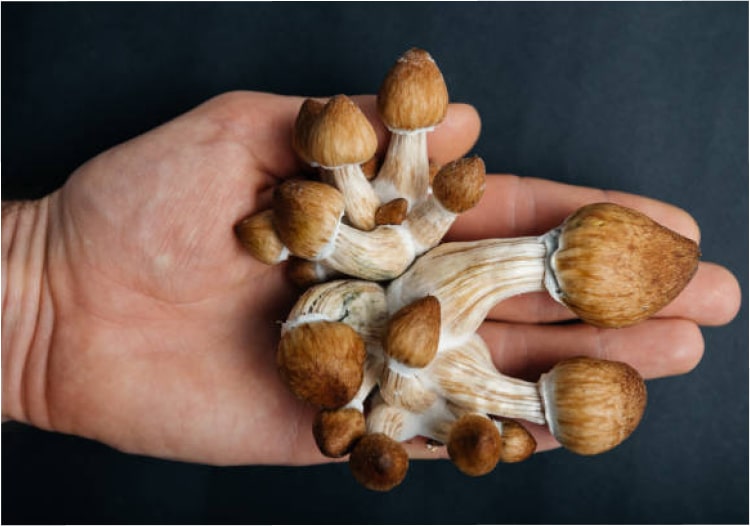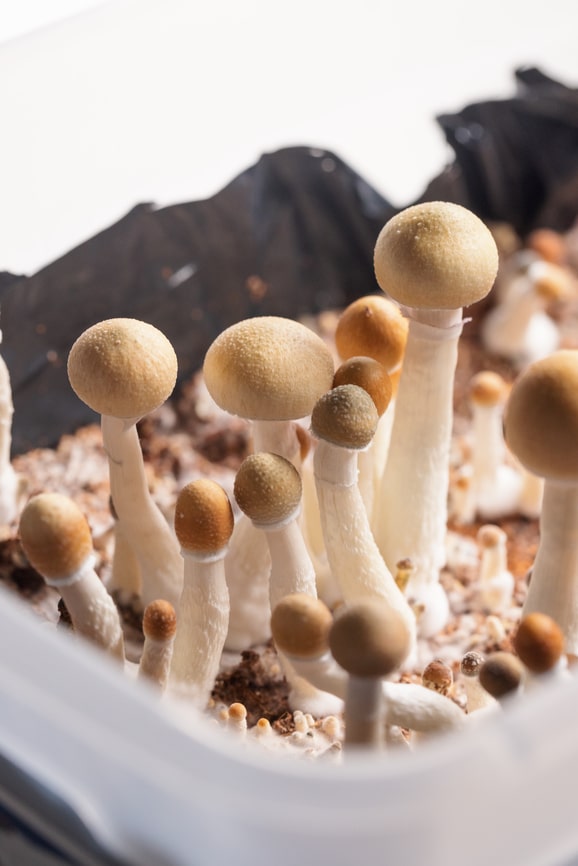These mind-altering chemicals have the potential to revolutionize the world of individual and collective mental health
What are Psychedelics?
“Psychedelics are a class of drugs, both naturally occurring and laboratory-made, that can change one’s ways of thinking and alter perception and mood,” explains Ronan Levy, co-founder and executive chairman of Field Trip Health, a network of health centers offering ketamine-assisted psychotherapy.
According to Psychedelics Today podcast co-founder and CEO Joe Moore, many “classical psychedelics” have been available in the West for decades, largely illegally and for recreational use. These include:
- lysergic acid (LSD or acid)
- psilocybin (magic mushrooms)
- DMT
- mescaline (peyote)
“Many more have been developed since, and many more are still being developed for assorted medical indications,” Moore adds.
In the Netflix series, "The Business of Drugs," chemist and Hamilton's Pharmacoeia creator Hamilton Morris is quoted saying that the number of synthetic psychedelic drugs is estimated to be over 800.
In addition to the four listed above, some of the most popular psychedelics being studied right now include:
- MDMA (ecstasy or molly)
- ketamine
- Ayahuasca
- cannabis (as a light hallucinogen)

How Do Psychedelics Work in the Body and Mind?
“We don’t yet have a full grasp of this on account of prohibition and inappropriate barriers to research,” says Moore. “What we do know is that at the very least, the mind is distributed through the body.”
“Each psychedelic targets specific receptors in the brain with varying degrees of effect. However, it’s believed that the 5HT2A serotonin receptor is the receptor responsible for the psychedelic experience,” adds Levy.
Psychiatrist and CEO of the Ketamine Research Foundation, Phil Wolfson, MD, reminds us that we’re still in the very beginning of understanding how they interact with our brain’s networks and neurotransmitter systems. But he says that we can gain insight from subjective and non-subjective research methods, like:
- fMRI (functional MRI) studies
- visualizations of the brain
- electroencephalography
- talking with people who are doing or have done psychedelics.
According to Wolfson, the therapeutic effects of psychedelics may stem from many factors:
Changes in neuron networks are seen on MRI. These changes, like reduction in complex brain connections, changes in blood flow, may be lasting. During this time frame, Wolfson explains, new neural synapses can grow. This may enable people to:
- learn new skills
- adopt new perspectives
- change habits to support happier, more resilient outlooks and emotions
The Fascinating History of Psychedelics
“Psychedelics have been used for eons for spiritual and religious purposes in almost all cultures around the world,” says Levy.
Introduced to Western culture during the 1950s, psychedelics were studied extensively for their applications in:
- mental health
- substance use disorders
- other therapeutic uses
But shortly after, things took a turn for the worse.
1960s counterculture and the War on Drugs
“In the mid-1960s, the non-medical and non-therapeutic uses of psychedelics gained traction with the anti-war and counterculture movement,” explains Levy.
“The hippie culture was seen as a threat to national security,” adds Moore.
This cultural trend led to a political backlash that resulted in psychedelics like psilocybin and LSD being classified as illegal Schedule 1 drugs in the United States. Psychedelic research was largely shut down for decades until Rick Strassman, MD, revived DMT research in 1990.
"Contrary to what was often taught in many high school awareness programs in the United States during the War on Drugs era, a growing body of evidence suggests that psychedelics may be 'quite safe and incredibly effective medicines.'"
Ronan Levy, co-founder and executive chairman, Field Trip Health

A modern psychedelic renaissance
Now, leading research organizations are investing in learning more about the healing power of psychedelics.
“Over the last 10 years, a psychedelic renaissance has emerged,” says Levy.
Contrary to what was often taught in manyhigh school awareness programs in the United States during the War on Drugs era, a growing body of evidence suggests that psychedelics may be “quite safe and incredibly effective medicines,” adds Levy.
Moore credits Rick Doblin, PhD, and his nonprofit, the Multidisciplinary Association for Psychedelic Studies (MAPS), with bringing back research funding to MDMA and other psychedelic compounds.
“We can thank his massive efforts for where we are today with many publicly traded companies doing work in psychedelics, and many more private companies."

Potential Mental Health Benefits
According to Levy, psychedelics can offer a path toward healing and transformation when combined with therapeutic support for integration into your daily life.
"Multiple evidence-based studies from world-class institutions have demonstrated that using psychedelics can produce profound, sustained results in as little as one session."
Joe Moore
Co-founder and CEO, Psychedelics Today podcast
Moore notes that the current list of potential health benefits isn’t exhaustive, with more uses being researched now. And although the information looks promising, more trials with larger sample sizes are needed before these wider uses can be confirmed.
Clinical conditions
In terms of mental and emotional therapeutic uses, psychedelic therapy may actually be able to heal or treat some conditions, instead of just masking symptoms like many pain and psychiatric medications do.
Research on psychedelics in therapeutic settings shows promise for clinical uses, including:
- end-of-life anxiety
- suicidal ideation
- chronic pain
- phantom limb pain
- depression, especially major depressive disorder and treatment-resistant depression
- substance use disorders
- eating disorders
- obsessive-compulsive disorder (OCD)
- post-traumatic stress disorder (PTSD)
- existential distress
- sexual dysfunction and lack of sexual desire
Depression and anxiety
At Levy’s Field Trip Health centers, healthcare professionals are primarily treating depression and anxiety through ketamine-assisted therapy protocols. And the results are impressive.
“On average, our clients are seeing significant improvements in severe to mild depression and anxiety, and those benefits sustain for 120 or more days,” he says. “To our knowledge, there’s currently no more effective treatment option available.”
Neurological conditions
Many psychedelics may also be potent anti-inflammatory molecules. Research is underway to explore their application in the treatment of neurological conditions like:

Clinical Uses and Applications
According to Moore, psychedelics are often used for a variety of purposes — from PTSD therapy to religious ceremonies and even couples therapy.
Different ways to engage in the use of psychedelics include:
- psychedelic-assisted psychotherapy (PAP)
- microdosing
- international retreats
- guided sessions
- clinical trials
- religious ceremonies
Legality, accessibility, and safety practices all range, depending on the location.
"Engineers, architects, chemists, and more solved many of their intractable professional problems in a few hours under the influence of LSD. This could hold great promise for solar, wind, fusion, and battery technology."
Joe Moore
Co-founder and CEO, Psychedelics Today podcast
Empathy and creativity
Psychedelics can also enhance empathy and creativity to positively impact our planet.
“Engineers, architects, chemists, and more solved many of their intractable professional problems in a few hours under the influence of LSD. This could hold great promise for solar, wind, fusion, and battery technology,” Moore adds.

“As the evidence around these uses continues to advance, the applications of psychedelics will extend into far greater realms of society and may be useful tools in helping to respond to some of the most vexing challenges facing humanity today,” says Levy.

Where We’re at Now
Psychedelics are still illegal in many countries around the world, including the United States. However, ketamine is legal worldwide.
"The stigma around the use of psychedelics should not prohibit the evidence from the research. Science should drive the policies in the future."
Head of Medical Affairs, Healthline Media
“Due to legal constraints in the United States, we have very little federal science dollars helping with psychedelic research,” says Moore. “Some federal funding was provided on some smoking cessation studies, but we have a long way to go to help accelerate this research so that we can help improve the human condition.”
That doesn’t mean research isn’t happening, though.
“The stigma around the use of psychedelics should not prohibit the evidence from the research,” says Jenny Yu, MD, FACS, the head of Medical Affairs at Healthline. “Science should drive the policies in the future.”
According to Moore, some countries with active “above ground” research include:
- Canada
- Germany
- New Zealand
- Switzerland
- United Kingdom
- United States
Some of the leading organizations paving the way in psychedelic research include:
- The University of California, Los Angeles (UCLA)
- The University of California, San Francisco (UCSF)
- The University of California, San Diego (UCSD)
- NYU Langone Health
- Harvard University
- Yale University
- Johns Hopkins Medicine
Wolfson's team at the Ketamine Research Foundation is also looking into psychedelic therapy's effect on postpartum depression and menstrual symptoms, as well as music's impact on psychedelic therapy.

Health Equity Considerations
The decades-long War on Drugs negatively impacted countless individuals and families across the world, especially People of Color.
So, how will the psychedelics industry ensure accessibility and inclusivity?
"Psychedelic therapy isn't accessible to the everyday person at the moment, let alone those in under-resourced communities or facing socioeconomic challenges."
In terms of financial accessibility, psychedelic therapy treatments will be expensive. Moore notes they could cost over $20,000. Wolfson adds that insurance coverage tends to be “pretty meager” or “absent,” which might keep treatments out of reach for many.
This means psychedelic therapy isn’taccessible to the everyday person at the moment, let alone those in under-resourced communities or facing socioeconomic challenges.
“As psychedelics become legal, I think that [financial support] will become more and more of a need,” says Wolfson.
He explains that this may lead many people to seek psychedelic therapy with substances like psilocybin and MDMA via “underground” or illegal means from unlicensed people who may be practicing as though they’re licensed.
But according to Levy, these conversations around access and inclusion are front and center in the psychedelic industry.
“As with all health services, it’s a very important objective to take on, and also one that will require effort from a number of different directions and stakeholders to achieve,” he says. “the good news is that for-profits and nonprofits are all working together to ensure broad-based access to psychedelic therapies.”

The Future of Psychedelics
These experts envision a possible trajectory for psychedelic use, in terms of legalization, pharmaceuticals, and more.
"The War on Drugs is a colossal failure. We [need to] get out of this horrible imprisonment practice."
Phil Wolfson, MD
Psychiatrist, CEO of the Ketamine Research Foundation
Wolfson’s hope is that in 5 years, psychedelics will be much closer to legalization in the United States.
In those 5 years, Wolfson hopes that the War on Drugs ends with the United States following countries like Brazil and Portugal in legalization and decriminalization of psychedelics.
“The War on Drugs is a colossal failure,” Wolfson says. “We [need to] get out of this horrible imprisonment practice.”
Moore sees a future where a few hundred psychedelic compounds may be approved for more than 20 clinical uses accessed via hospitals, clinics, and at-home treatments.
“I also see safer celebrations where people are consuming less [of] dangerous substances, [like] alcohol and tobacco,” says Moore.
He hopes for a future where the everyday person may be able to visit a reputable vendor to legally purchase safe, high-quality psychedelics.
Legalization
Oregon is already leading the way in the United States by decriminalizing psilocybin. In 2020, a measure was approved to create the first legal jurisdiction for psilocybin therapies.
Other states are looking into similar programs, including:
- California
- Florida
- Maine
- Hawaii
According to Levy, MDMA-assisted therapy can be expected to be FDA-approved for PTSD treatment in 2023. Psilocybin is also on track to be FDA-approved for treating major depressive disorder and treatment-resistant depression in 2025.
As more research unveils the healing benefits of psychedelics, the United States Drug Enforcement Administration may decontrol or reschedule as less harmful certain psychedelic substances under The Controlled Substances Act.

Are Psychedelics Right for You?
Although psychedelics have many potential benefits, they may not be for everyone.
Potential risks
Certain underlying medical conditions or drug interactions can potentially put you at risk for negative effects. Using alcohol in combination with psychedelics can also be dangerous.
Psychedelics can pose serious health and safety risks for some people, including those who:
- live with or are predisposed to psychotic disorders, like schizophrenia
- take certain medications, such as selective serotonin reuptake inhibitors (SSRIs)
- have cardiovascular issues, which can be fatal in some rare cases
- have other medical or emotional issues that may carry risks
- are pregnant or breastfeeding
Psychedelics are still illegal in most places, and possessing them can lead to fines or imprisonment, depending on where you live.
Harm reduction
It’s important to speak with a therapist or trained guide who can lead you in trying psychedelics safely and legally.
Mental health care professionals can give you the right guidance and monitoring when taking a new pharmacologically active substance. Consider having an open dialogue with your doctor and therapist to weigh potential risks and benefits.

Let's Recap
“This process is teaching us so much about human beings that we may have new data to help us radically transform and improve how we understand, operate, and treat our bodies,” Wolfson says.
"Imagine a world where groups with centuries of mistrust and hatred could have some treatments and then treat the other like another valuable human instead of resorting to violence."
Phil Wolfson, MD
He explains that psychedelics could transform personal and political landscapes through better understanding.
“Imagine a world where groups with centuries of mistrust and hatred could have some treatments and then treat the other like another valuable human instead of resorting to violence,” he adds. “Is this what they meant by better living through chemistry? Maybe.”
Let's recap what we know. Studies show that psychedelic therapy may have the potential to:
- treat mental health conditions
- improve individual and collective well-being
- offer many other powerful health benefits
And right now, it looks like this much-needed research will continue for years to come.
Psychedelic education
If you’re interested in learning more about the therapeutic future of psychedelics, consider checking out these leaders paving the way:
- Multidisciplinary Association for Psychedelic Studies (MAPS): Founded by Rick Doblin in 1986, this nonprofit organization raises awareness and provides education about psychedelics.
- Johns Hopkins Medicine: The Johns Hopkins Center for Psychedelic and Consciousness Research is currently studying psilocybin, among other substances.
- Psychedelics Today: a psychedelic podcast and education company for therapists and anyone interested in learning more about psychedelics.
- Paul Stamets: Stamets is a famous mycologist and author who studies fungi, sells natural supplements, and has presented talks like, “How Mushrooms Can Help Save the World.”
- The Ketamine Research Foundation: This nonprofit provides training for practitioners, collects data on ketamine-assisted psychotherapy, and offers support for those looking to find relief from trauma.
- Alexander Shulgin Research Institute: This organization aims to honor and continue the research work of psychedelics pioneer Alexander “Sasha” Shulgin, PhD.